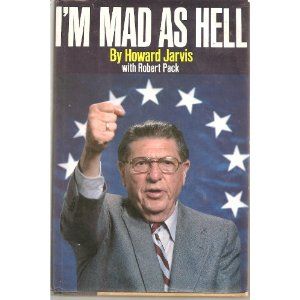Revving Up Higher Property Taxes
By KATY GRIMES
Every year the Legislature attempts to rewrite Proposition 13, the 1978 ballot initiative that successfully returned property value assessments to 1975 levels, limited property taxes to 1 percent of assessed valuation and capped annual property tax increases to 2 percent.
The 2012 attack of Proposition 13 was launched last week at an Assembly Revenue and Taxation Committee hearing. The hearing was ostensibly about defining what a change in ownership constitutes, and whether it was time to reassess that definition, but quickly turned into an all-out onslaught on the measure.
Warned Assemblywoman Diane Harkey, R-San Juan Capistrano, committee vice chairwoman, “Proposition 13 is one of the few business incentives that California has left.”
‘Nuke Prop 13’
The latest anti-Proposition 13 party line is that the proposition has fallen prey to “unintended consequences.” This theme was parroted several times throughout the hearing, with Democrats claiming that school funding cuts are the “unintended consequences.”
The law states clearly that a change in ownership occurs and reassessment takes place after a property sale, formal ownership transfer or new construction is completed. The Legislative Analyst’s Office confirmed this: “Most properties are reassessed to market value when (1) a change-in-ownership occurs or (2) new construction takes place. Only the improved portion of the property is reassessed to market value following new construction.”
Assemblyman Tom Ammiano, D-San Francisco, has long been an advocate for “nuking” Proposition 13, and has complained that the law has allowed business and commercial land owners to benefit from “tax loopholes,” while residential homeowners are responsible for the largest burden of property taxes. Ammiano’s solution is to tax commercial property owners more, instead of reducing property taxes all around.
Ammiano comes from the school where government is entitled to more money from taxpayers, and should have unrestricted access to it when needed. Prop. 13 has a 2 percent limit on annual property taxes increases. And, as an additional check, the Legislature is required to have a two-thirds vote of both to raise state taxes — an issue also under attack by Democrats.
Howard Jarvis Lives
The champion of Proposition 13 was taxpayer crusader, Howard Jarvis (pictured above), who capitalized on the bad mood taxpayers were in, after 10 years of dramatic increases in property tax bills.
Jarvis passed away in 1986, but the Howard Jarvis Taxpayers Association still fights for taxpayers through defending Prop. 13.
However, despite the entire hearing surrounding Prop. 13, the association was not invited to participate in the hearing.
Split Rolls and Higher Taxes
Lenny Goldberg, executive director of the California Tax Reform Association, a pro-tax group, has been a vocal proponent of assessing commercial property to at higher rates than homes. Goldberg said that because so many commercial properties are held in limited-liability partnerships and trusts, ownership is a fuzzy concept. Sometimes partners sell off interest, eventually bringing in all new partners. According to Goldberg, because the legal partnership or family trust continues, many big businesses avoid property reassessments.
Goldberg advocated a split-roll property tax system.
But as California Taxpayers Association Consultant David Doerr reminded committee members, at the same time Prop. 13 was on the ballot, there was also a measure to split the tax roll, which voters did not approve.
“A split-roll system comes in two versions,” explained CalTax. “One attempts to reassess non-homeowner property to reflect fair market value when no change in ownership has occurred. The other seeks to apply a higher rate to the current acquisitions value of non-owner occupied property.”
CalTax and the HJTA have insisted for many years that a split roll will only result in a massive increase in the cost of doing business in California.
“The shirkers are freeloaders,” said Jennifer Bestor, former treasurer of the Oak Knoll Parent-Teacher Association in Menlo Park. “All that noise is a smokescreen for greed.”
Bestor said she did her own research into county tax records and concluded that those who benefit the most from Prop. 13 are freeloaders whose neighbors subsidize the government services used by everyone. “We’ve created individual entitlements,” Bestor said.
Bestor made it sound as if owners of commercial properties and homes prior to Prop. 13’s passage have been stealing something from the more recent property owners. Bestor’s solution was to impose higher taxes on longtime property owners, instead of reducing property taxes tax for new buyers.
“If you think the way I do, property taxes are not evil,” Bestor said. “They are not a sin tax.”
The Problem Isn’t Prop. 13
After the hearing, Harkey said that the problem is not with Prop. 13, but how the Legislature distributes school funding. “If we increase property taxes, it just means that less money will come from the general fund,” Harkey said, explaining the motivation of Legislative Democrats.
The end of the hearing brought spontaneous testimony from David Wolfe, legislative director for the Howard Jarvis Taxpayers Association. Wolfe spoke for only a few minutes during the public comments, but had important details to add to the hearing.
Wolfe reminded the committee that prior to the passage of Prop. 13, homeowners who had paid off their mortgages were getting taxed out of their homes and ending up in foreclosure because of such rapidly increasing property taxes. Wolfe told the committee that in 1992, the United States Supreme Court ruled 8-1 that California’s assessment value system, and Prop. 13, were “inherently fair.”
“You know 30 years down the road what you will be paying,” Wolfe said. And equally important, “local governments know what they will receive in property taxes every year,” Wolfe added. “Without Prop. 13, property tax revenue would have decreased by half.”
I asked Wolfe why the Howard Jarvis Taxpayers Association was not asked by the committee to participate in the hearing when the subject was about dramatically altering the law. “A legislative hearing on change in ownership automatically assumes that a topic of discussion will be an alteration in Prop. 13’s 1 percent cap for residential and commercial property,” Wolfe said. “As the chief protector of this landmark ballot proposition, we would hope HJTA would be formally invited to participate in such hearings in the future, instead of being limited to rushed comments in public testimony.”
CalTax and the Howard Jarvis Taxpayers Association warn that if the Legislature splits the tax roles and commercial property is taxed at whatever rate politicians claim they need, large employers will flee the state, while small employers and businesses, which can’t afford to move, will be burdened with unsustainable tax increases.
“Prop. 13 does not shift the property tax burden to homeowners. The assessed value on non-homeowner property subject to Prop. 13 has grown an average of 8.5 percent per year, while homeowners’ property tax has grown an average of 8.3 percent,” reports CalTax. “Thus, the Prop. 13 property taxes paid by non-homeowners have outpaced homeowners’ property tax burden. In fact, Prop. 13 has prevented a property tax shift to homeowners.”
Related Articles
Government's Favorite Day
By John Seiler: Today is government’s favorite day: Tax day. It comes three days later this year, on April 18.
Some crucial context on Brown’s new energy policy and AB 32
Gov. Jerry Brown’s decision to seek to extend the state of California’s push against global warming to 2030 with a
We’re all undocumented!
JUNE 24, 2010 By LAURA SUCHESKI California senators and assembly members gathered on the West Steps of the Capitol Wednesday




